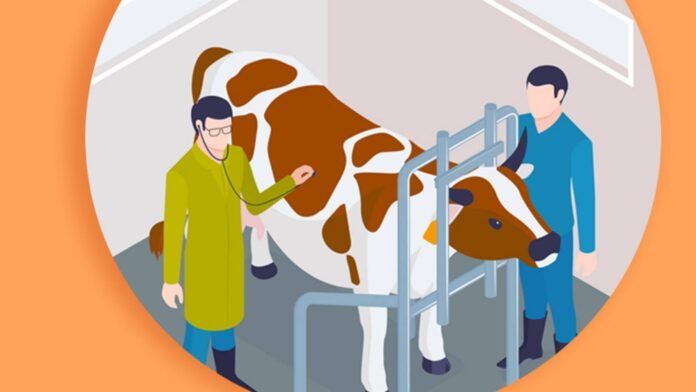VETERINARIANS AND ANIMAL WELFARE: ENSURING ETHICAL TREATMENT OF ANIMALS
Dr. Aditya Pratap
PhD Scholar, Department of Veterinary Medicine,
College of Veterinary Science & A. H., Jabalpur, NDVSU, Jabalpur, Madhya Pradesh
Abstract
The term “animal welfare” describes the state of the animals and the steps done to keep them safe from abuse, misery and exploitation. This entails giving animals the sustenance, housing, and healthcare they require in addition to making sure they don’t endure needless pain, mistreatment, or neglect. When it comes to ensuring that animals are treated ethically and with care, veterinarians are indispensable. These experts have the knowledge and experience to support the rights, well-being and health of animals as animal advocates. Veterinarians work hard to uphold moral principles and guarantee that animals are treated humanely in a variety of settings.
Keywords: Animal Welfare, Ethical Treatment, Veterinarians Role
Introduction
A healthy life is of prime requirement for any individual, be it a man or a pet. Preventing or lessening animal suffering and fostering animal welfare are together referred to as “animal welfare.” Companion animals and animals used on farms or in labs are among the overarching objectives. A further aspect of animal welfare is making sure that the social, physical, and behavioural requirements of animals are satisfied as well as that they are treated with care and respect. As a result of their poor treatment and lack of care, veterinarians are frequently the first people in contact with animals in need of assistance.
Animal welfare is an important issue because animals are sentient beings that are capable of experiencing pleasure, pain, and other emotions. They deserve to be treated with respect and to live a life free from unnecessary suffering. Veterinarians play the most crucial role in the life of an animal. There are various organizations and laws in place to promote and protect animal welfare. These include animal welfare laws and regulations, as well as animal welfare organizations that work to raise awareness about animal welfare issues and advocate for the protection of animals. Overall animal welfare is a crucial aspect of our society and it is important that we all work together to ensure that animals are treated with respect and kindness.
Principles of Animal Welfare
There are certain principles pertaining to animal welfare which emphasized the basic needs of animals mainly.
- Freedom from thirst and hunger– by ready access to fresh water and a diet to maintain full health and vigor.
- Freedom from discomfort- by providing an appropriate environment including shelter and a comfortable resting area.
- Freedom from pain, injury and disease- by prevention or rapid diagnosis and treatment.
- Freedom to express most normal behaviour- by providing sufficient space, proper facilities, and company of the animal’s own kind.
- Freedom from fear and distress– by ensuring conditions and treatment which avoid mental suffering.
These principles are the basics of animal welfare and ensure that the social, physical, and behavioural requirements of animals are satisfied. Veterinarians play an important role as they are closely related to animals as well as their human parents. Apart from being a clinician, a veterinarian plays certain important roles, like actively participating in awairing people about the rights and welfare of the pet animals, participating in certain projects and programmes related to animal welfare legislations. A Veterinarian is responsible to reduce the suffering of the animal and also for the overall betterment of the society. A severe indicator of a familial history of abuse is the willful, purposeful mistreatment of animals. Veterinarians who report suspected animal cruelty might occasionally save other family members who are vulnerable particularly youngsters or elderly adults, from experiencing the same maltreatment. More than 90% of veterinarians, according to two surveys, would report suspected animal cruelty situations to the appropriate authorities. Most people concurred that maltreatment of animals in homes is frequently associated with maltreatment of elderly individuals or children.
Veterinarians have a responsibility to treat their patients with ethics. As everyone knows, animals are unable to communicate with us in the same way that humans do about their emotions and experiences. Therefore, it is our duty as a doctor of millions of species to guarantee the general well-being of our patients by doing all within our power. In order to reduce animal suffering and preserve general health, veterinarians place a high priority on preventative treatment. This covers yearly immunizations, frequent examinations and training on safe pet ownership. Veterinarians contribute to illness prevention and early intervention by highlighting preventative measures which ensures ethical treatment via proactive healthcare.
Conclusion
Maintaining the ethical treatment of animals requires the expertise of veterinarians. Their proficiency, empathy and dedication enable them to deliver vital healthcare, encourage prophylactic actions and fight for animal rights. Veterinarians make a substantial contribution to the welfare and ethical treatment of animals by collaborating closely with pet owners, livestock farmers and the general public.



